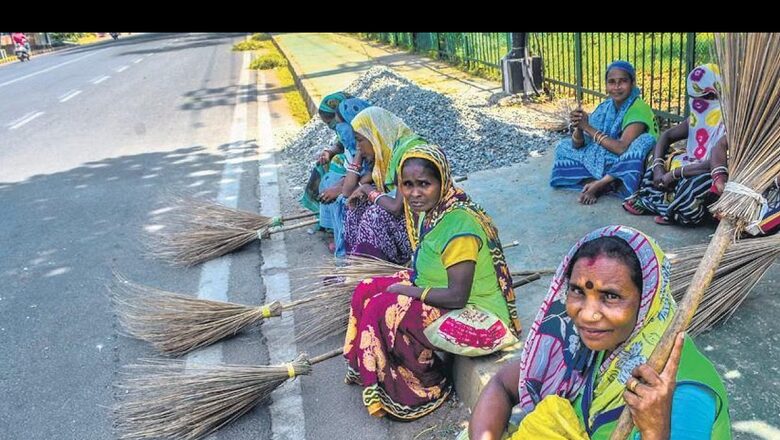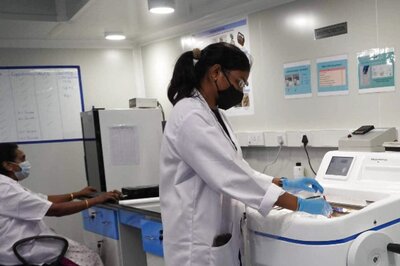
views
In the vast tapestry of India’s sanitation sector, a group of unsung heroes has emerged—women sanitation workers. These resilient women are pioneering change, not only transforming their own lives but also catalysing a shift in sanitation practices across the nation. Their stories of determination, perseverance, and triumph are a testament to the power of individual action in creating a cleaner, healthier future for India.
The Unseen Labor
For far too long, sanitation work has been associated with invisibility and societal neglect. Women sanitation workers, often operating in the shadows of society, have shouldered the burden of keeping our communities clean and hygienic. Their unwavering commitment is often met with deplorable conditions, inadequate pay, and a lack of recognition. Yet, they have remained steadfast in their mission to provide a vital service to society.
Maya Sable’s journey epitomises the strength and resilience of women sanitation workers. After 12 years of toiling in the unorganised sector, she found herself abandoned by her husband, leaving her to fend for herself and her three daughters. However, Maya refused to be defeated. She underwent training at the Harpic World Toilet College and secured a job in housekeeping. Now, she earns more than double her previous salary and enjoys access to essential benefits like PPE kits, Provident Fund, ESI, and insurance. Maya is not just a beneficiary; she’s a beacon of hope, actively raising awareness and empowering fellow workers with the knowledge she gained.
Empowerment Through Training
The Harpic World Toilet College plays a pivotal role in the transformation of these women’s lives. Harpic, as India’s leading brand in the lavatory care segment, has a deep and nuanced understanding of the specific challenges these women face, and they channelled this understanding into the creation of the Harpic World Toilet College (HWTC) in 2016.
HWTC was established with the stated objective of improving the quality of life of sanitation workers through their rehabilitation by linking them with dignified livelihood options. Workers trained by the college are provided placement with various organisations. Following the successful proof of concept in Rishikesh, HWTCs have opened in Maharashtra, Aurangabad, in partnership with Harpic, Jagran Pehel and Maharashtra Government.
Through training programs, HWTC equips and empowers these women to secure better-paying jobs in the organised sector, transforming their lives and those of their families.
Pinky Vivek Jadhav’s story exemplifies this transformation. As the sole breadwinner for her family, she struggled to make ends meet, even having to pull her daughter out of school due to financial constraints. Pinky’s life took a turn for the better when she enrolled in the Harpic World Toilet College’s training program. With newfound skills and determination, she set up a small grocery shop and ensured her family’s well-being.
Changing Perceptions
Beyond economic empowerment, women sanitation workers are changing societal perceptions. Laxmi Vijay Ghodke, who spent eight years cleaning public toilets without acknowledgement, now stands proudly as the first lady supervisor at MGM Hospital, Aurangabad. Her dedication and exceptional work ethic led to her rapid promotion, as did the soft skills training she received at HWTC. Laxmi’s story challenges stereotypes and proves that women can excel in roles traditionally dominated by men.
Chhaya Warekar, another graduate of HWTC, is working diligently to provide her children with the best education possible. She aspires for them to become government officers, breaking the cycle of sanitation work in her family. Chhaya’s determination showcases the ripple effect of change initiated by women sanitation workers.
Breaking Cultural Barriers
In a society often bound by traditional norms, women sanitation workers like Manisha Sominath Khadke and Archana Sonavane have defied expectations. Manisha’s family initially resisted her decision to enrol with HWTC. Still, her determination prevailed, and she is now a valued employee at United CIIGMA Hospital, Aurangabad. Her success has challenged her family’s perception of gender roles and ignited a change in mindset.
Archana Sonavane’s conservative family prohibited her from leaving her home for proper employment or training. However, the digital program offered by HWTC opened doors. Archana’s decision has not only transformed her life but also her family’s fortunes. During the pandemic, she provided for her family while her husband lost his job, earning both their respect, and a sense of independence.
Financial Independence
After her husband’s tragic accident, Varsha Vijay Landge sought a stable, well-paying job to support her family and her daughter’s education. Her enrollment in HWTC’s training program paved the way for a permanent job at Hegdewar Hospital, Aurangabad. Today, Varsha’s daughter is an engineer, illustrating the power of financial independence in securing a brighter future for families.
When her husband fell ill, Priyanka Jadhav began cleaning toilets to support her family. However, her colleagues introduced her to the online training program at HWTC, which transformed her life. Not only did she acquire new skills, but she also gained newfound respect for her work. Priyanka’s permanent job at MGM Hospital during the pandemic ensured financial stability for her family and enabled her to save for her children’s future.
Health and Safety
Chitra’s story underscores the hazardous conditions faced by sanitation workers. For years, she cleaned toilets with bare hands, exposing herself to health risks. However, her encounter with Gramalaya and health educators transformed her understanding of safety and hygiene. With proper training, she now uses safety gear, practises better hygiene, and ensures regular medical check-ups. Chitra’s story highlights the urgent need for improved safety measures for sanitation workers across India.
Advocacy and Leadership
Some women sanitation workers have transcended their roles to become advocates and leaders in their communities. Priyanka Bharti, for instance, refused to accept a life without a toilet as the norm when she got married. Her activism led to the construction of a toilet in her in-laws’ village, catalysing change not only for her family but for neighbouring communities as well. Priyanka’s journey as a sanitation ambassador demonstrates the immense impact that one individual can have on society.
There are many such stories.
Harpic joined hands with News18 in Mission Swachhta aur Paani, a movement that champions the cause of inclusive sanitation, equality for all genders, abilities, castes and classes and the strong belief that clean toilets are a shared responsibility. Through Mission Swachhta aur Paani, we’re bringing you these unsung stories, not just to valorise these women, but also to spark conversations. What we talk about matters.
Join us here, to take part in these conversations that are shaping a Swasth and Swachh Bharat, not just for ourselves, but also for those who are our frontline in this fight.




















Comments
0 comment